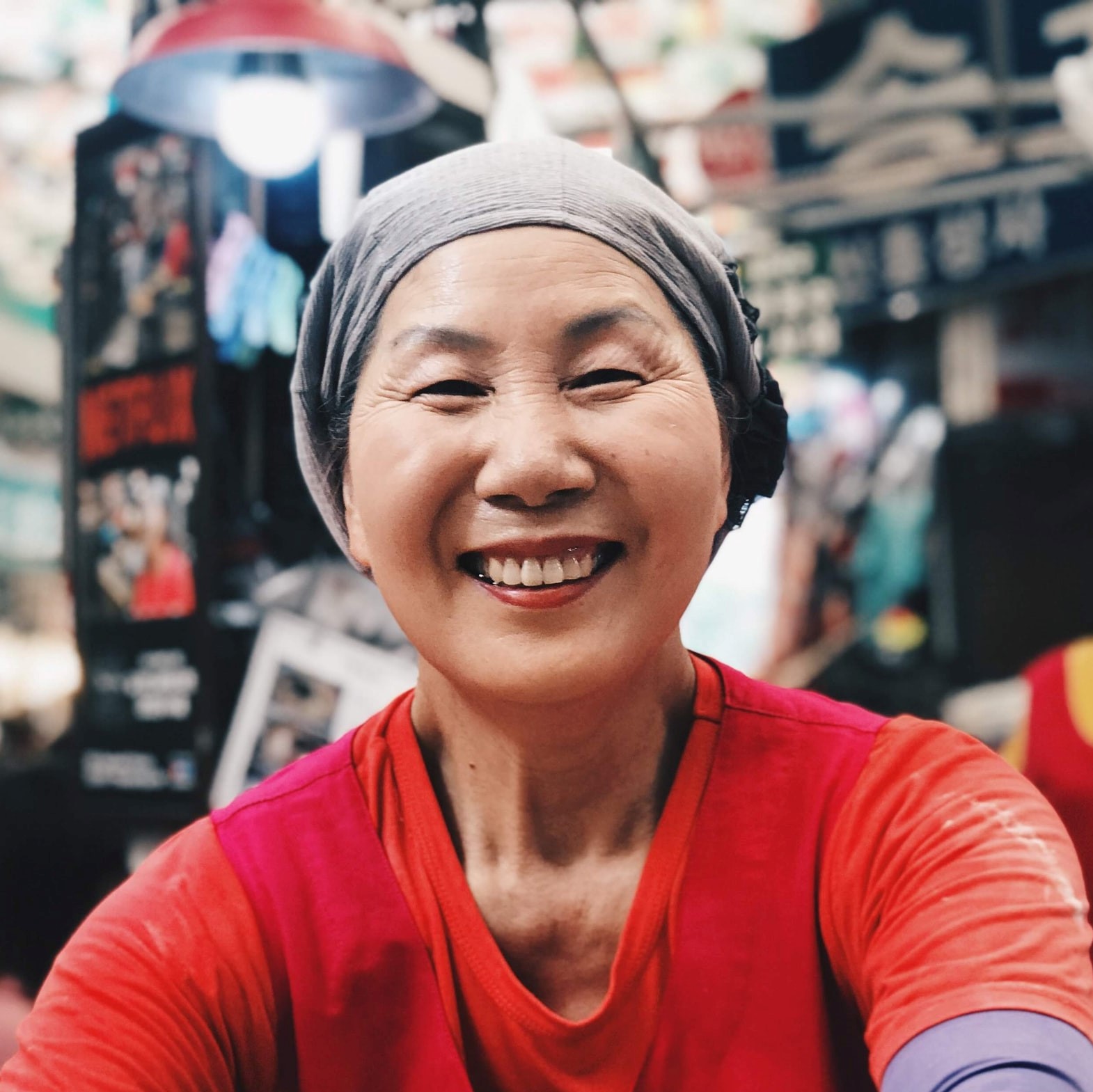Photo by Grace Lim on Unsplash
In this post we’ll learn some basic Korean vocabulary and grammar that you can use to describe people.
아름다운! areumdaun! Beautiful!
Let’s start with some basic adjectives that you can use to describe people’s physical characteristics. You’ll see two forms. The first one is the form you’d use right before a noun (a tall woman), and the second one in parentheses is the form you’d use with be in English: she is tall. More on that in the grammar note below! 키가 큰 kiga keun (키가 크다 kiga keuda) tall; 키가 작은 kiga jageun (키가 작다 kiga jagda) short; 젊은 jeolmeun (젊다 jeolmda), 어린 eolin (어리다 eolida) young; 늙은 neulkeun old (늙었다 neulgeotda); 뚱뚱한 ttungttunghan (뚱뚱하다 ttungttunghada) fat; 날씬한 nalsshinhan (날씬하다 nalsshinhada) thin; 아름다운 areumdaun (아름답다 areumdabda) beautiful; 못생긴 motsaenggin (못생겼다 motsaengyeotda) ugly. Let’s see some examples:
- 여자는 키가 크다.여자는 날씬하다.
yeoja-neun kiga keuda. yeoja-neun nalsshinhada.
The woman is tall/ thin. - 키가 큰 여자는 내 아내이다.
kiga keun yeojaneun nae anae-ida.
The tall woman is my wife. - 남자는 키가 작다. 남자는 강하다. 남자는 뚱뚱하다.
namjaneun kiga jagda. namjaneun ganghada. namjaneun ttungttunghada.
The man is short/ fat.
- 키 작은 남자는 선생님이다.
ki jag-eun namja-neun seonsaengnim-ida.
The short man is the teacher. - 나의 할아버지/할머니는 연세가 많다.
na-e hal-abeoji/halmeoni-neun yeonsega manhda.
My grandfather/My grandmother is old/elderly. - 소년은 어리다.
sonyeon-eun eolida.
The boy is young. - 우리는 어린 아들이 있다.
uli-neun eolin adeul-i itda.
We have a young son.
GRAMMAR TIP! When you use adjectives in Korean, there are two important things that you should keep in mind. First, adjectives in Korean are verbs. That means that you don’t need a form of be to say something like “he is tall” or “she is strong.” Instead, you say something like “he talls” or “she strongs,” because tall and strong in Korean are verbs. They even have tense! “She stronged” means “she was strong.” If you’re a fan of grammatical terminology, this use of an adjective is called predicative.
Second, if you want to use an adjective right before a noun (an attributive adjective, if you like grammatical terminology), you need to use a special form of the adjective/verb ending in –은 –eun or -ㄴ -n. For example, you’d use the full verbal forms 어리다 eolida (am/is/are young) or 키가 크다 kiga keuda (am/is/are tall) after a noun to form a full sentence, but the forms 어린 eolin (young) or 키가 큰 kiga keun (tall) right before a noun, as in:
- 소년은 어리다. / 어린 소년은 우리 아들이다.
sonyeon-eun eolida. / eolin sonyeon-eun uli adeul-ida.
The boy is young. / The young boy is our son. - 여자는 키가 크다. / 키가 큰 여자는 내 아내이다.
yeoja-neun kiga keuda. / kiga keun yeoja-neun nae anae-ida.
The woman is tall. The tall woman is my wife.
And don’t forget that Korean verb-adjectives have all the same honorific forms as any verb: 키가커 kiga keo 키가 커요 kiga keoyo 키가 큽니다 kiga keumnida and so on.
행복해요, 슬퍼요? haengboghaeyo, seulpeoyo? Happy or Sad?
Now let’s see a few more adjectives that describe people’s moods or emotions or other non-physical characteristics: 행복한 haengbokhan (행복하다 haengbokhada) happy; 슬픈 seulpeun (슬프다 seulpeuda) sad; 똑똑한 ttokttokhan (똑똑하다 ttogttoghada) intelligent; 어리석은 eoriseogeun (어리석다 eoliseogda) foolish; 재미있는 jaemiitneun (재미있다 jaemiitda) entertaining, interesting; 인기있는 ingiitneun (인기있다 ingiitda) popular; 운동을 좋아하는 undongeul johahaneun (운동을 좋아하다 undong-eul johahada) sporty, athletic; 게으른 geeureun (게으르다 geeuleuda) lazy; 강한 ganghan (강하다 ganghada) strong; 약한 yakhan (약하다 yakhada) weak; 용감한 yonggamhan (용감하다yonggamhada) brave; 수줍은 sujubeun (수줍어하다 sujubeohada) shy; 말이 많은 mari manheun (말이 많다 mari manda) talkative; 조용한 joyonghan (조용하다 joyonghada) quiet; 결혼한 gyeolhonhan (결혼하다 gyeolhonhada) married; 혼자인 honjain (혼자이다 honjaida) single; 친절한 chinjeolhan (친절하다 chinjeolhada) friendly, nice; 불친절한 bulchinjeolhan (불친절하다 bulchinjeolhada) unfriendly, mean.
- 여자는 똑똑하다.
yeoja-neun ttogttoghada.
The woman is intelligent. - 똑똑한 여자이다.
ttogttoghan yeoja ida.
She is an intelligent woman. - 남자는 강하다.
namjaneun ganghada.
The man is strong. - 강한 남자이다.
ganghan namjaida.
He is a strong man. - 강한 여자이다.
ganghan yeojaida.
She is a strong woman. - 내 여동생은 친절하다. 내 여동생은 불친절하다.
nae yeodongsaeng-eun chinjeolhada. nae yeodongsaeng-eun bulchinjeolhada.
My younger sister is friendly/ unfriendly. - 내 남동생은 친절하다. 내 남동생은 불친절하다.
nae namdongsaeng-eun chinjeolhada. nae namdongsaeng-eun bulchinjeolhada.
My brother is friendly/mean. - 소녀는 수줍어하다.
sonyeo-neun sujub-eohada.
The girl is shy. - 수줍은 소녀이다.
sujub-eun sonyeoida.
She is a shy girl. - 행복해요, 슬퍼요?
haengboghaeyo, seulpeoyo?
Are you happy or sad? - 우리 선생님은 재미있다.
uri seonsaengnim-eun jaemi itda.
Our teacher is interesting. - 인기있는 가수다.
ingiitneun gasuda.
She’s a popular singer. - 경찰관은 용감하다.
gyeongchalgwan-eun yong-gamhada.
The police officer is brave.
Learn Korean with the Language Garage
Check out our other posts on Korean language, culture, and more. And if you’re looking for convenient and affordable live Korean lessons with a real teacher, check out The Language Garage. Our lessons are given online in a virtual classroom, so it doesn’t matter where you live or work – we can come to you. And we have flexible options, with a free trial so that you can decide if there’s a fit. Check us out!





